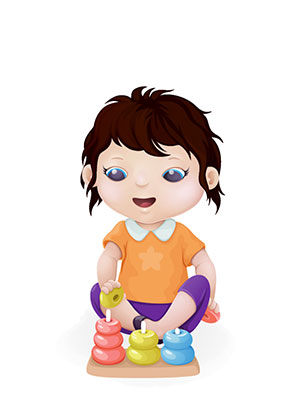All toddlers have their own timetable, but you can watch for certain developments around this time. Celebrate with your child as she reaches or nears these milestones.
Cognitive
-
May begin to have a sense of time (napping after lunch, bathing before bed)
-
Actively explores objects by touch and movement (shaking, banging, throwing)
-
Searches for hidden items where last seen
-
Puts objects in and takes them out of containers
-
Sorts shapes; organizes rings by size
-
Looks at picture books by herself
-
Points to objects you name (nose, picture of a cat in a book)
-
Engages in more pretend games
-
Imitates real life in play (feeding a doll, sweeping)
-
May follow a two-part command (“Go to the hall and bring me your shoes”)
Motor
-
Climbs on furniture, possibly out of her crib
-
Walks or at least cruises
-
May walk backward and in circles
-
May try to kick a ball (not always accurately)
-
May be able to run
-
May walk up stairs with help
-
May dance
-
Intentionally releases items from her grasp, closer to 18 months
-
Uses a spoon and possibly a fork
-
Removes some clothing; extends arms and legs to help when being dressed
-
Turns pages
-
May begin to scribble
-
May throw overhand
Communication
-
Tries to copy words you say
-
Uses a single word as a sentence (“juice” for “I want juice,” “bye-bye” for “I want to leave now”)
-
Says at least five words, by 15 months
-
May say up to 30 words, by 18 months
-
May start to use simple phrases, 18 to 24 months
-
Understands concepts of up, down, off, and hot
Social
-
Gets easily frustrated
-
Separation anxiety may continue, peaking around 18 months
-
May develop an attachment to a security blanket or toy
-
Shows preferences for certain people and things
-
Increasingly understands that she’s a separate person from you with her own preferences, feelings, and ideas
-
May say “no” to express frustration
-
May show empathy (for example, pat your back when you’re upset)
-
Prefers parallel play (playing next to, rather than with, another child)

